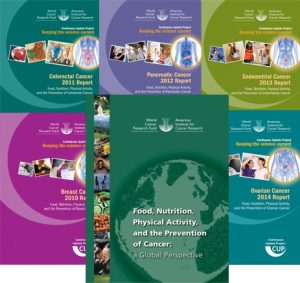An article in this morning’s New York Times Science Section, “An Apple a Day, and Other Myths,” attempts to grapple with the complex nature of diet-cancer science, but leaves the reader with a very misleading impression of the state of the research.
The article quotes a recent talk by epidemiologist, and AICR Expert Panel member Dr. Walter Willett. “Diet and cancer has turned out to be more complex and challenging than any of us expected,” he said. All of us at AICR know this only too well. Unfortunately, the article goes on to equate “complex and challenging” with “does not matter.”
“Make no mistake,” says AICR Director of Research Susan Higginbotham, PhD, RD, “this is not a conclusion that accords with an objective and systematic analysis of the available science. If there’s one thing AICR’s research has shown, and continues to show, it’s that when it comes to cancer risk, diet does matter.”
It’s true, of course, that research continues to evolve between 1997, when the AICR/WCRF Expert Report systematically collected and judged the evidence linking various dietary factors to cancer risk, and 2007, when we released our Second Expert Report. That’s the nature of research.
But the NYT grossly mischaracterizes the research when it claims that our 2007 Expert Report “all but reversed the findings” of our 1997 report. In fact, the evidence that diets high in a variety of plant foods protect against cancer not only remains strong — it has grown more detailed.
We now know that cancer is not one disease. The evidence gathered and judged in our Expert Reports and the ongoing Continuous Update Project — which continues to collect and systematically analyze new evidence and update our judgments on a cancer-by-cancer basis — show that diet plays a more central role in some types of cancer than others.
These reports and their updates have shown, for example, that:
- Diets high in whole grains protect against colorectal cancer.
- Diets high in carrots, squash and other foods containing carotenoids reduces the risk of mouth, pharynx and larynx cancers.
- Diets high in non-starchy vegetables — such as broccoli, lettuces, and beans – protects against esophageal cancer.
- Cutting processed meat out of the diet, and moderating red meat intake to no more than 18 ounces (cooked) per week, reduces the risk of colorectal cancer.
And in 2011, our Continuous Update Report on colorectal cancer concluded that the evidence that foods containing fiber protect against colorectal cancer has grown stronger since our 2007 Expert Report.
In his talk, Dr. Willett himself noted several promising areas for future investigation, including questions around the roles of milk, calcium, vitamin D, lycopene, blueberries and more.
The article is correct in noting that it will always be difficult if not impossible to perform randomized controlled trials to study the links between diet and cancer. This is exactly why efforts like the Continuous Update Project, which provides a transparent infrastructure for the comprehensive and systematic analysis of the epidemiological research that is being done is so desperately needed.
“We agree that a reductive focus on the putative protective properties of individual foods, nutrients and phytochemicals only misleads the public,” said Higginbotham. “But the evidence that whole diets involving a wide variety of plant foods provides real protection remains as strong as ever.”






Can the NYT not be made to print some kind of rebuttal? The impression I got from what they said is that diet matters not at all. Great for the restaurants – not so great for those who work with nutrition on a daily basis and are trying to steer people in a healthier diretion?
I almost barfed when I read the New York Times column. It’s so misleading, especially that line about the 2007 report reversing its findings.
The line from the report that he quotes to back up that statement has to do with studies on all fruits and vegetables and their effects on cancer in general. Why doesn’t the writer acknowledge that the 2007 report also stated that the evidence was “probable” that certain foods are linked to certain cancers?
He also writes about a recent conference focusing on things other than diet–including the role of chronic inflammation. So he thinks that diet and chronic inflammation have no connection?
Thank you so much for this timely response. There is overwhelming evidence that diet matters – not just for cancer, but for promoting health in general. Nutrition is complex and erroneous conclusions from improperly oversimplifying data are misleading and have very unfortunate consequences that cost lives. Thanks for the great updates!